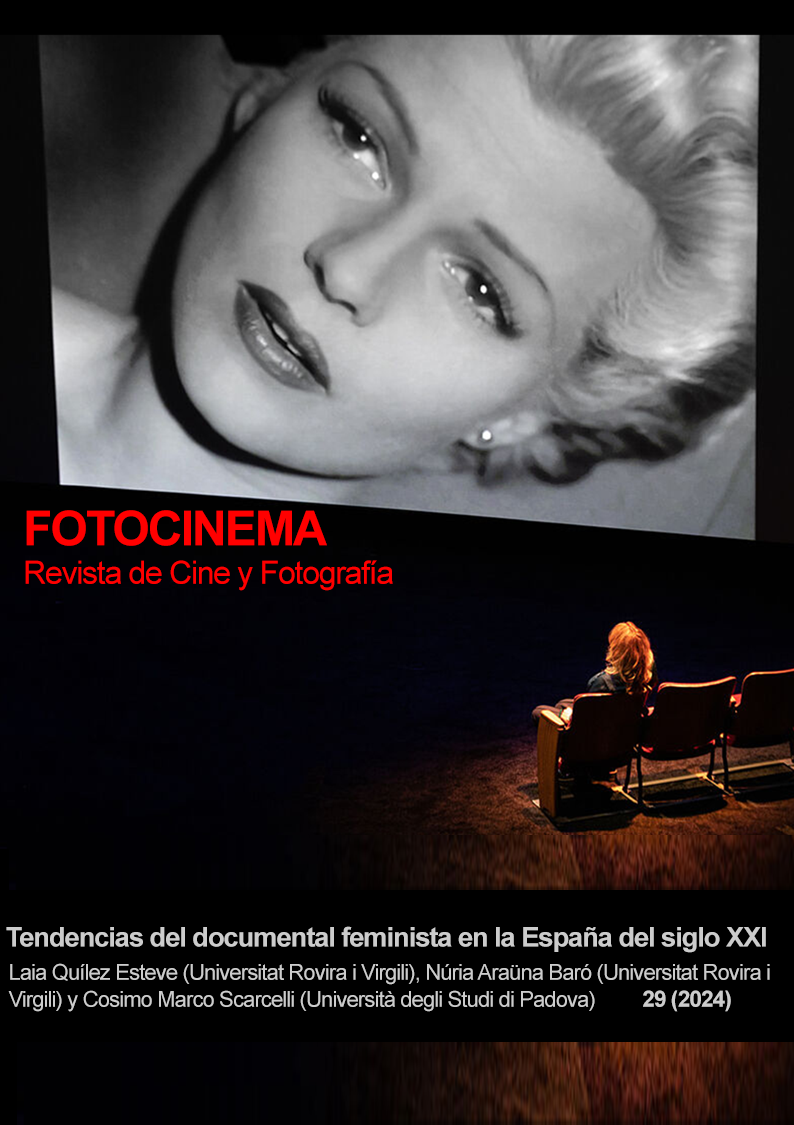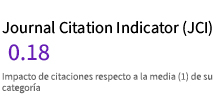El nuevo documental y el activismo de la cuarta ola feminista. Arenas de silencio: Olas de valor (Chelo Álvarez-Stehle, 2016) y El techo amarillo (Isabel Coixet, 2022)
DOI:
https://doi.org/10.24310/fotocinema.29.2024.19224Keywords:
forth wave feminism, sexual violence, autoethnography, haptic visualityAbstract
This article uncovers the relationships between certain authorial documentary practices and the narratives of the contemporary feminist movement by analyzing the themes and expressive resources present in Sands of Silence: Waves of Courage by Chelo Álvarez-Sthele and The Yellow Ceiling by Isabel Coixet. The first documentary transforms ethnographic discourses about “the others,” women from distant cultures, through the intersection of trafficking for sexual exploitation in Mexico, Nepal and India and child sexual abuse in Spain. The second offers a complex and reflective approach to the collective complaint of some former students of the Aula de Teatre de Lleida that resonates with the global Me Too movement. The article emphasizes the importance of the feminist genealogy of the organizational formulas and cinema of the third wave for the current ethical treatment of the testimony of survivors that overcomes reductionist and re-victimizing arguments. Furthermore, it explores how the haptic and sensory imagery of these choral documentaries appeals to empathy and solidarity between women outside of spectacularization and voyeurism.
Downloads
Metrics
Publication Facts
Reviewer profiles N/A
Author statements
Indexed in
-
—
- Academic society
- N/A
- Publisher
- Universidad de Málaga
References
Álvarez Stehle, Ch. (18 de febrero de 2017). El abuso sexual es una pandemia / Entrevistada por Inma Sanchís entrevista. La Vanguardia. https://www.lavanguardia.com/lacontra/20170218/42111154638/el-abuso-sexual-es-una-pandemia.html
Álvarez-Stehle, Ch. (Directora). (2016). Sands of Silence: Waves of Corage / Arenas de silencio: olas de valor [Película]. InnerLENS Productions.
Amorós, C. (2000). Presentación (que intenta ser un esbozo del status questionis). En C. Amorós (Ed.), Feminismo y Filosofía (pp. 9-10). Síntesis.
Barry, K. (1988). Esclavitud sexual de la mujer. La sal, edicions de les dones.
Brownmiller, S. (1975). Against our will: Men, women and rape. Robert Brady.
Bruzzi, S. (2000). New Documentary. A Critical Introduction. Routledge.
Català Domènech, J. M. (2021). Posdocumental. La condición imaginaria del cine documental. Shangrila.
Cobo Bedia, R. (2017). La prostitución en el corazón del capitalismo. Catarata.
Cobo Bedia, R. (2019). La cuarta ola: la globalización del feminismo. Servicios Sociales y Política Social, 36(119), 11-20.
Cobo Bedia, R. (2024). La ficción del consentimiento sexual. Catarata.
Coixet, I. (Directora). (2022). El sostre groc / El techo amarillo [Película]. Miss Wasabi.
Cuevas Álvarez, E. (2013). Home Movies as Personal Archives in Autobiographical Documentaries. Studies in Documentary Film, 7(1), 17-19. https://doi.org/10.1386/sdf.7.1.17_1
Chamberlain, P. (2017). The Feminist Fourth Wave: Affective Temporality. Palgrave Macmillan.
Delegación del Gobierno contra la Violencia de Género (2019). Macroencuesta de Violencia contra la Mujer 2019. https://bit.ly/3t4jOra
De Miguel Álvarez, A. (2015). La revolución sexual de los sesenta: una reflexión crítica de su deriva patriarcal. Investigaciones Feministas, 6, 20-38. http://dx.doi.org/10.5209/rev_INFE.2015.v6.51377
Delicado-Moratalla, L. (2021). Entrevista a Sheila Jeffreys. “La humillación de las mujeres para la excitación de los hombres”, ATLÁNTICAS – Revista Internacional de Estudios Feministas, 6(1), 247-261. https://dx.doi.org/10.17979/arief.2021.6.1.7315
Jeffreys, S. (2011). La industria de la vagina. La economía política de la comercialización global del sexo. Paidós.
Kuhn, A. (1991). Cine de mujeres. Feminismo y cine. Cátedra.
Lasage, J. (1978). The Political Aesthetics of the Feminist Documentary Film. Quaterly Review of Film Studies, 3(4), 507-523. https://doi.org/10.1080/10509207809391421
Marks, L. (2000). The Skin of the Film. Intercultural Cinema, Embodiment, and the Senses. Duke University Press.
Mayer, S. (2011). Cambiar el mundo, film a film. En S. Mayer y E. Oroz (Eds.), Lo personal es político: feminismo y documental (pp. 12-42). Gobierno de Navarra.
Mohanti, Ch. T. (2022). De vuelta a “Bajo los ojos de Occidente”. En L. Suárez Navaz y R. Aída Hernández (Eds.), Descolonizando el feminismo. Teorías y prácticas desde los márgenes (pp. 404-467). Cátedra.
Munro, E. (2013). Feminism: A Fourth Wave. Political Insight, 4(2), 22-25. https://doi.org/10.1111/2041-9066.12021
Nichols, B. (1997). La representación de la realidad. Cuestiones y conceptos sobre el documental. Paidós.
Nichols, B. (2013). Introducción al documental. Universidad Nacional Autónoma de México.
Organización de Naciones Unidas, Mujeres. (2022). Hechos y cifras: Poner fin a la violencia contra las mujeres. https://shorturl.at/jsEK7
Paszkiewicz, K. (2017). El tacto es discreto o no es nada. La relacionalidad en el cine de Isabel Coixet. En B. Zecchi (Coord.), Tras las lentes de Isabel Coixet: cine, compromiso y feminismo (pp. 83-100). Prensas de la Universidad de Zaragoza.
Renov, M. (2004). The Subject of Documentary. University of Minnesota Press.
Rothwell, J. (2017). Los documentales de Isabel Coixet: Una vocación social. En B. Zecchi (Coord.), Tras las lentes de Isabel Coixet: cine, compromiso y feminismo (pp. 379-394). Prensas de la Universidad de Zaragoza.
Russell, D. E. H. (1975). The Politics of Rape. The Victim’s Perspective. Stein and Day.
Russell, C. (1999). Experimental Ethnography: The Work of Film in the Age of Video. Duke University Press.
Sarachild, K. (1978). Consciousness-raising: A radical weapon. En Redstockings of Women’s Liberation Movement (Ed.), Feminist Revolution: An Abridged Edition with Additional Writings (pp. 144-150). Random House.
Serra, X. (14 de diciembre de 2022). Isabel Coixet: “Con El techo amarillo he aprendido que existe la sororidad”. Diari ARA. https://shorturl.at/bwDJ7
United Nations Office on Drugs and Crime. (2020). Global Report on Trafficking Persons 2020 (31-36). https://shorturl.at/oPR24
Waldman, D. y Walker, J. (1999). “Introduction”. En D. Waldman y J. Walker (Eds.), Feminism and Documentary (pp. 1-35). University of Minnesota Press.
Weinrichter, A. (2004). Desvíos de lo real. El cine de no ficción. T&B.
Zimmerman, T. (2017). #Intersectionality: The Fourth Wave of Feminist Twitter Community. Atlantis, 38(1), 54-70. https://journals.msvu.ca/index.php/atlantis/article/view/4304
Downloads
Published
How to Cite
Issue
Section
License
Copyright (c) 2024 Maribel Rams Albuisech

This work is licensed under a Creative Commons Attribution-NonCommercial-NoDerivatives 4.0 International License.
All contents published in Fotocinema Revista científica de cine y fotografía are protected under the Creative Commons Attribution-NonCommercial-ShareAlike 4.0 International (CC BY-NC-SA 4.0) license. All about this license is available in the following link: <http://creativecommons.org/licenses/by-nc-sa/4.0>
Users can copy, use, redistribute, share and exhibit publicly as long as:
- The original source and authorship of the material are cited (Journal, Publisher and URL of the work).
- It is not used for comercial purposes.
- The existence of the license and its especifications are mentioned.
There are two sets of authors’ rights: moral and property rights. Moral rights are perpetual prerogatives, unrenounceable, not-transferable, unalienable, imprescriptible and inembargable. According to authors’ rights legislation, Fotocinema. Revista científica de cine y fotografía recognizes and respects authors moral rights, as well as the ownership of property rights, which will be transferred to University of Malaga in open access. The property rights are referred to the benefits that are gained by the use or the dissemination of works. Fotocinema. Revista científica de cine y fotografía is published in an open access form and it is exclusively licenced by any means for doing or authorising distribution, dissemination, reproduction, , adaptation, translation or arrangement of works.
Authors are responsable for obtaining the necessary permission to use copyrighted images.














13.png)



